2018年高考英语二轮复习专题——介词和介词短语
文档属性
| 名称 | 2018年高考英语二轮复习专题——介词和介词短语 |  | |
| 格式 | zip | ||
| 文件大小 | 302.1KB | ||
| 资源类型 | 教案 | ||
| 版本资源 | 外研版 | ||
| 科目 | 英语 | ||
| 更新时间 | 2017-12-31 22:42:52 | ||
图片预览


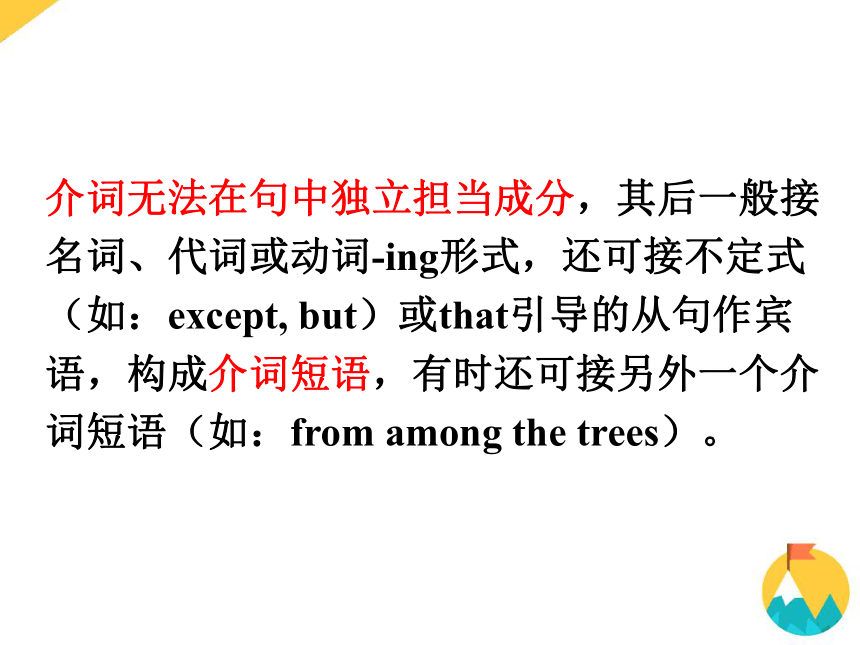
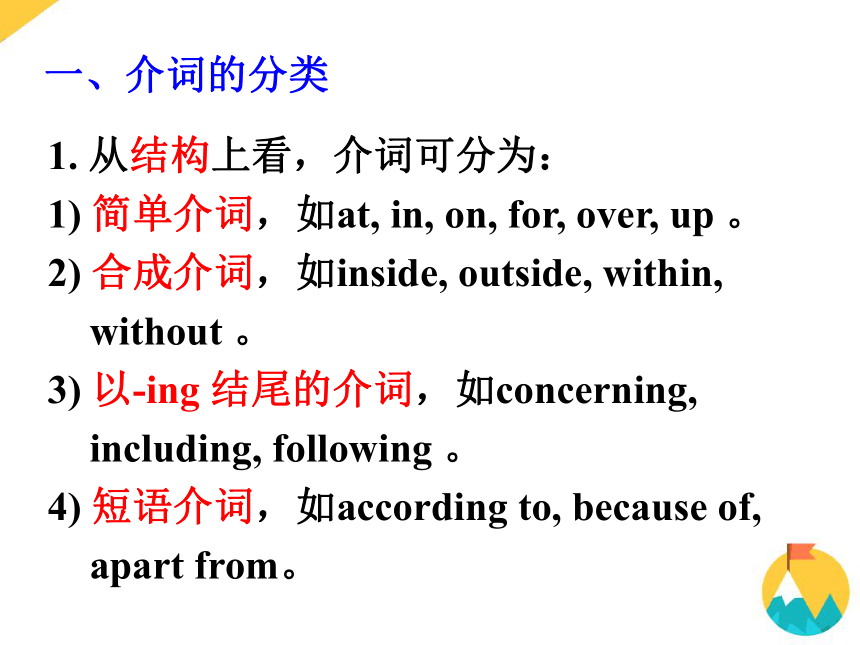
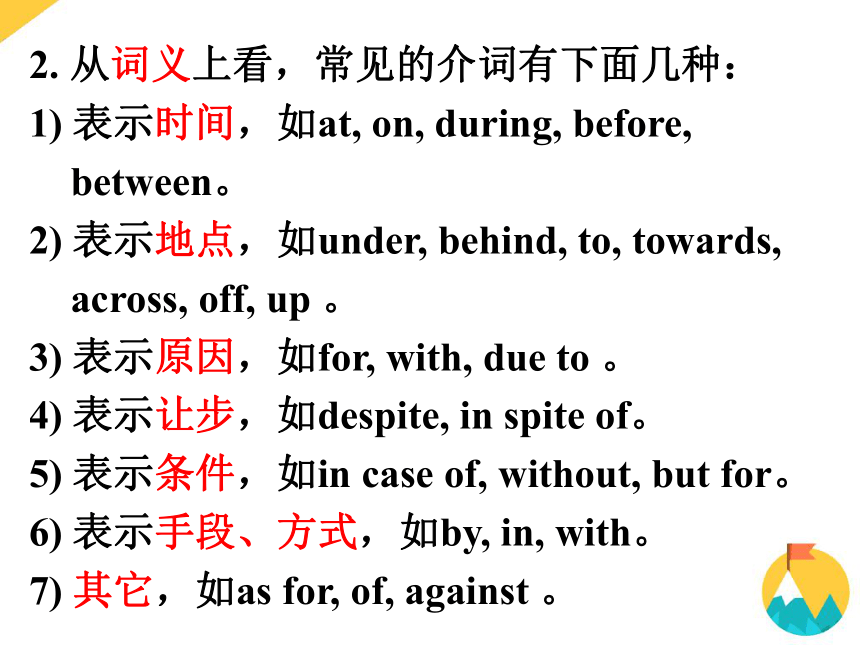
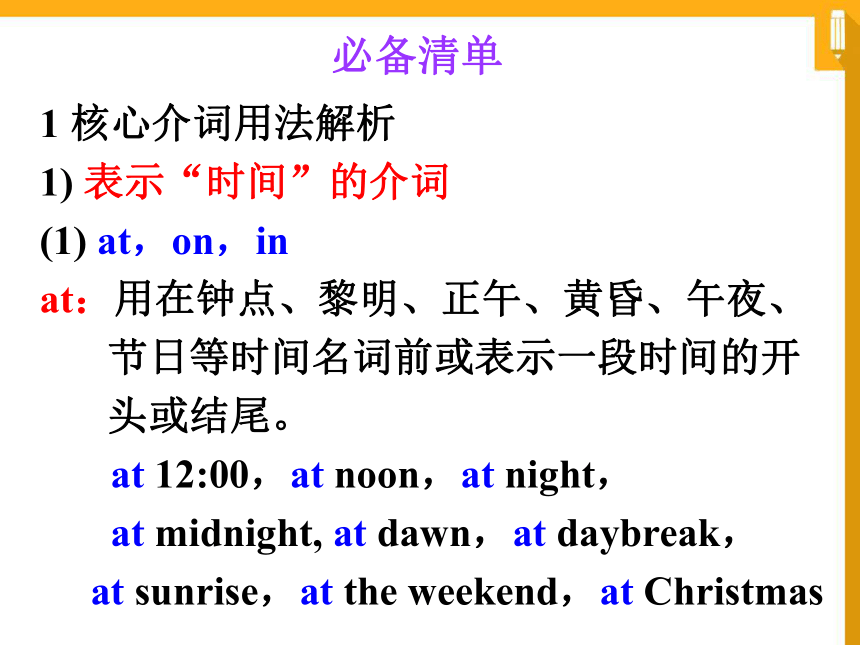
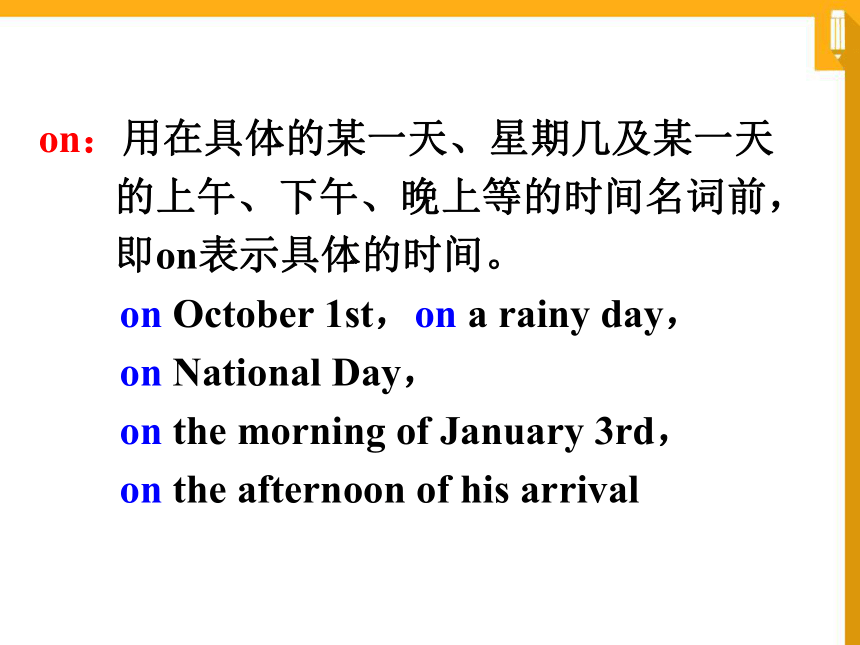
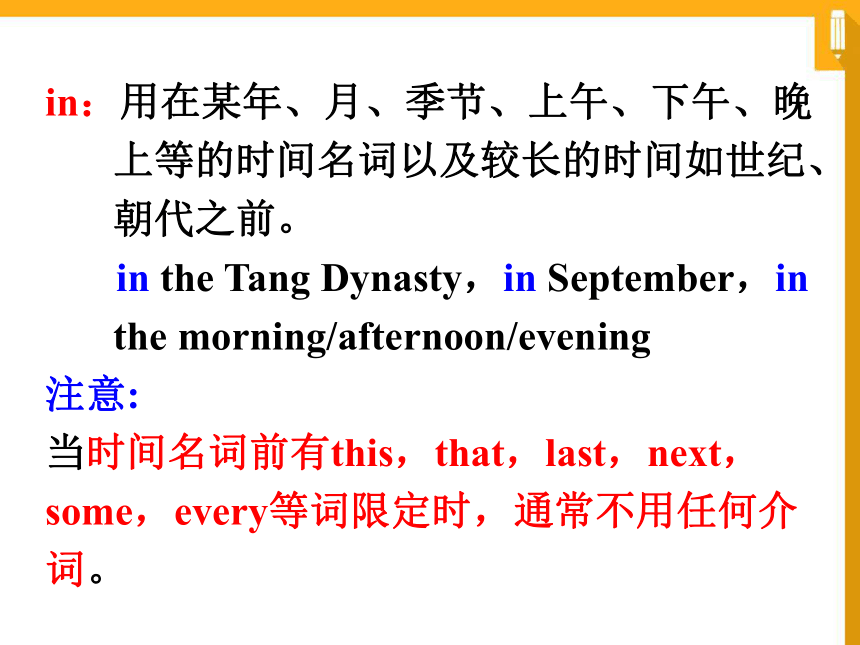
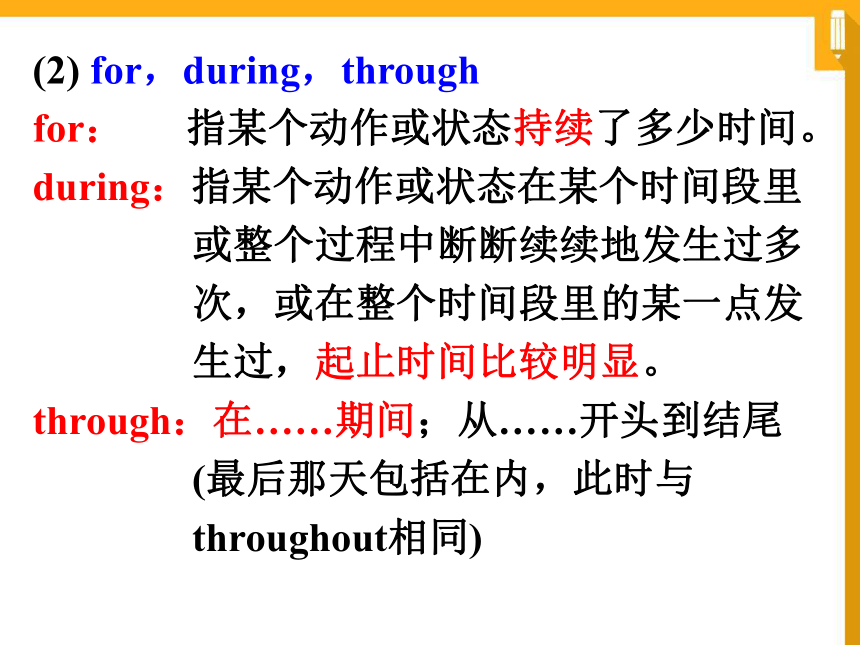
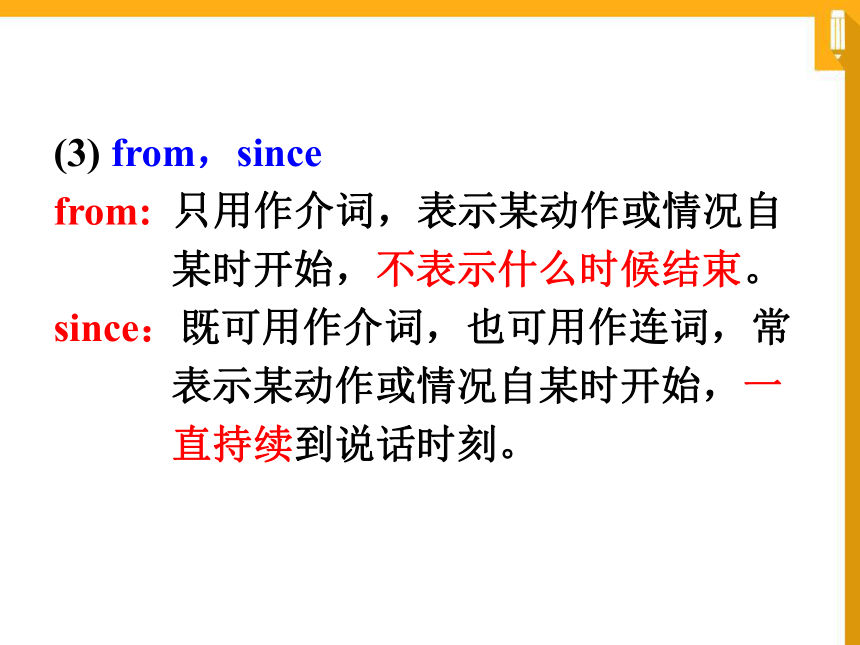
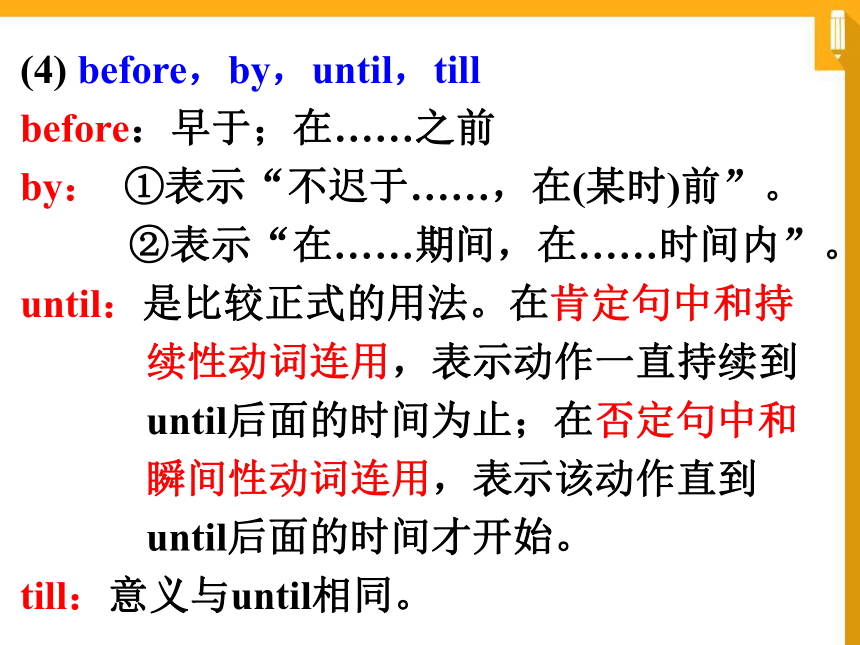
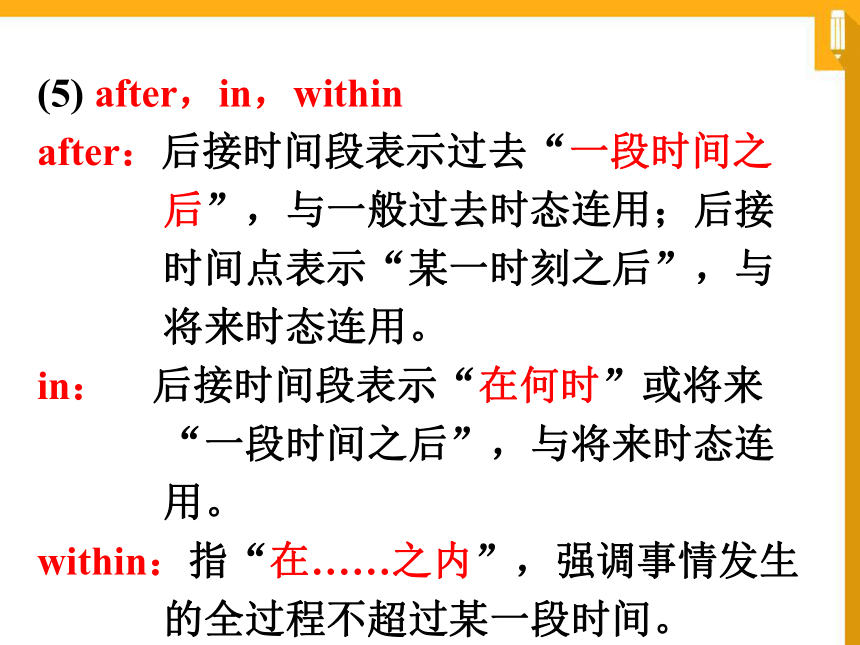
文档简介
(共83张PPT)
介词无法在句中独立担当成分,其后一般接名词、代词或动词-ing形式,还可接不定式(如:except, but)或that引导的从句作宾语,构成介词短语,有时还可接另外一个介词短语(如:from among the trees)。
一、介词的分类
1. 从结构上看,介词可分为:
1) 简单介词,如at, in, on, for, over, up 。
2) 合成介词,如inside, outside, within, without 。
3) 以-ing 结尾的介词,如concerning, including, following 。
4) 短语介词,如according to, because of, apart from。
2. 从词义上看,常见的介词有下面几种:
1) 表示时间,如at, on, during, before, between。
2) 表示地点,如under, behind, to, towards, across, off, up 。
3) 表示原因,如for, with, due to 。
4) 表示让步,如despite, in spite of。
5) 表示条件,如in case of, without, but for。
6) 表示手段、方式,如by, in, with。
7) 其它,如as for, of, against 。
1 核心介词用法解析
1) 表示“时间”的介词
(1) at,on,in
at:用在钟点、黎明、正午、黄昏、午夜、节日等时间名词前或表示一段时间的开头或结尾。
at 12:00,at noon,at night,
at midnight, at dawn,at daybreak,
at sunrise,at the weekend,at Christmas
必备清单
on:用在具体的某一天、星期几及某一天的上午、下午、晚上等的时间名词前,即on表示具体的时间。
on October 1st,on a rainy day,
on National Day,
on the morning of January 3rd,
on the afternoon of his arrival
in:用在某年、月、季节、上午、下午、晚上等的时间名词以及较长的时间如世纪、朝代之前。
in the Tang Dynasty,in September,in the morning/afternoon/evening
注意:
当时间名词前有this,that,last,next,
some,every等词限定时,通常不用任何介
词。
(2) for,during,through
for: 指某个动作或状态持续了多少时间。
during:指某个动作或状态在某个时间段里或整个过程中断断续续地发生过多次,或在整个时间段里的某一点发生过,起止时间比较明显。
through:在……期间;从……开头到结尾 (最后那天包括在内,此时与throughout相同)
(3) from,since
from: 只用作介词,表示某动作或情况自某时开始,不表示什么时候结束。
since:既可用作介词,也可用作连词,常表示某动作或情况自某时开始,一直持续到说话时刻。
(4) before,by,until,till
before:早于;在……之前
by: ①表示“不迟于……,在(某时)前”。
②表示“在……期间,在……时间内”。
until:是比较正式的用法。在肯定句中和持续性动词连用,表示动作一直持续到until后面的时间为止;在否定句中和瞬间性动词连用,表示该动作直到until后面的时间才开始。
till:意义与until相同。
(5) after,in,within
after:后接时间段表示过去“一段时间之后”,与一般过去时态连用;后接时间点表示“某一时刻之后”,与将来时态连用。
in: 后接时间段表示“在何时”或将来“一段时间之后”,与将来时态连用。
within:指“在……之内”,强调事情发生的全过程不超过某一段时间。
2) 表示“动向,位置”的介词
(1) on,above,over和
below,under,beneath
① on,above,over皆可表示“在……之上”。
区别是on表示与表面接触的上方;
above表示“在……上方,高于”,但不垂直,表面不接触;
over表示正上方,强调“垂直在……之上”,如果over指上下接触,则含有部分或全部覆盖之意,还可表示动作在某物体的上方进行,意为“越过,通过”。
② below,under,beneath皆可表示“在……之下”。
below表示不垂直并与表面不接触的下方;
under表示垂直并与表面不接触的下方;beneath表示在某物之下,可以表示垂直或不垂直,也可以表示上下接触的意思。
(2) in front of,in the front of
两个介词短语皆有“在前面”的意思,区别是:
in front of通常相对于某物体的外部来说,指某人或某物位于该物前面,意为“在……前面”;
in the front of通常相对于空间而言,指某人或某物位于某个空间的内部,意为“在……的前部”。
(3) near,beside,by
beside和near都有“靠近”的意思,
beside强调“在……旁边(=at the side of)”,指两者的位置关系,多用于人;
near意为“在……附近(=at a short distance from)”,表示两者之间的距离,多用于场所,另外near还可表示时间或程度等。
by表示“在……旁边”时含有“倚,凭,靠,沿着”等意。
(4) about,round,around
表示“在……周围”时,
about指的是“靠近……周围”,不表示“把……团团围住”,
而round和around指“完全的、封闭的周围”,
round既可表示静态位置,也可表示动态的动作,
around通常表示静态的位置。
(5) along,across,through,by
along意为“沿着”,和动态动词连用,也可以和静态动词连用,表示“在空间的某一点上,在某一段空间里”。
across的含义与on有关,表示动作是在某一物体的表面进行的,指从一端到另一端或成十字交叉穿过。
across可以表示“在……对面或另一边”,相当于opposite。
through的含义与in有关,表示动作从物体中间穿过,这个动作是在三维空间进行的。
by表示从某物或某人的旁边经过。
3) 表示“原因,理由”的介词
常见的有for,because of,owing to,due to,on account of,thanks to,out of等。
for:多与表示感情的抽象名词或动词及
reason,famous等词连用。
because of:意为“由于,因为”,强调因果
关系,在句中仅作状语,修饰
句中的一部分,与其他成分不
用逗号隔开。
owing to: 与because of一样,也强调因果关系,除作状语外,也可作表语。作状语修饰整个句子,可放在句首或句末,用逗号隔开。
due to:引出造成后果的原因,在句中作表
语、状语和定语。作表语和状语时
与owing to同义,作状语时,一般
不用逗号与其他成分隔开。
on account of:与because of,owing to同
义,但语气较为正式。可
作状语、表语,但不作定语。
thanks to:只能用作状语,可以表示正面的意思“幸亏”,也可以用在讽刺口吻中(近于讽刺口吻的“感谢”)。
out of:意为“因为,出于,由于”,后面常
接抽象名词。
4) 表示“支持,反对”的介词
against:意为“反对”,指在观点或主张方面与某人采取对立的态度。
for: 指在观点或主张等方面与某人采取一致的态度,意思是“支持,赞成”,与in favor of 同义。
注意: against还有“倚着,靠着”的意思。
e.g. His bed is against the wall.
他的床靠墙放着。
5) 表示“除……之外”的介词
except: 指从所提到的人或事物中除去,即从整体中除去一部分。
but: 与except意义相同,但其语气较
except弱,常与不定代词和疑问代词
连用。
注意:
当except位于句首时,后面往往加上for。
Except for this,everything is in good order.
=Everything is in good order except this.
除此之外,一切状况良好。
except for:意为“除……之外”,它的含义是
肯定句子主体,排除局部。
besides:意为“除……之外(还有……)”。
注意:
besides还可用作副词,意为“而且;还有”。
e.g. I don't want to go; besides, I am too
tired.
我不想去了,再说我也太累了。
other than:意为“除……之外”,后可接名词、代词、动名词和动词原形,并且可以与but,except互换;但当except后接副词、介词短语和when从句等时,but/other than不可替换except。
apart from:既可以表示besides,又可以表示except或者except for,还可以表示without的意思。
注意:
用于否定句时,besides,except与but可相互替换。
No other students passed the difficult math exam except/besides/but Lin Tao and Wu Dong.
除林涛和吴东外,其他的学生都没有通过那次很难的数学考试。
介词和介词短语是高考的一个必考点,每年都保持在一至两个题目,命题形式除了单项填空外还在完形填空、语法填空、短文改错中进行考查,其考点主要涉及常用介词的用法区别,介词与动词、名词、形容词等的常见搭配,介词在特定语境中的选用和介词短语的用法等。掌握介词必须要立足基本用法,广泛记忆,细心体会比较。
一、考查介词的基本用法
常考介词有:
about, across, against, without, among, at, by, beyond, for, from, in, into, of, on, over, through, to, with等。
二、介词与其它词的习惯搭配。
三、介词短语辨析。
常考介词短语
1. 介词与名词的常用搭配:
1) at + n. 表示状态
at a loss 不知所措
at breakfast 早餐时
at peace 处于和平中
at rest 静止,不动
at sea 在海上,在航海
at war 在战争中
at work 在工作
2) at + n. 表示时间
at Christmas 在圣诞节
at dusk 在黄昏
at dawn 在黎明
at daybreak 在拂晓
at midnight 在午夜
at night 在夜里
at noon 在正午
at preset 目前
at sunrise 日出时
3) 以at开头组成的短语
at the beginning of 在……的开始
at the cost of 以……的代价
at the end of 在……的尽头
at the foot of 在……脚下
at the mercy of 在……支配下;
任由……摆布
at the price of 以……的价格
at the risk of 冒……的危险
at the sight of 一看到……就……
4) on + n. 表示状态
on a trip/ journey/tour 在旅行
on display 陈列 on exhibition 在展出
on show 在展出 on fire 着火
on duty / guard 在旅行
on holiday/ vacation 在度假
on line 在工作(或运行)
on sale 出售,打折
on the decrease 在减少
on the increase 在增加
on the go 在忙碌中
on the march 在进行中
on the way 在途中
on trial 在受审
5) 以on开头的介词短语
on account of 因为
on behalf of 代表
on condition that 在……的条件下,如果
on no account/ condition/occasion 决不
on the basis of 以……为基础
on the occasion of 在……时
6) by + n. 表示方式
by accident 偶然 by chance 偶然
by accident by air/plane 乘飞机
by coincidence 碰巧
by force 用暴力 by hand 用手工
by mistake 错误地 by the day 按天算
by nature 天生地
by radio 通过收音机
by telegraph 以电报形式
7) in + n. 表示方式
in cash 用现金付款 in detail 详细地
in width 在宽度上 in depth 在深度上
in English 用英语 in height 在海拔上
in length 在长度上 in ink 用墨水
in shape 在外形上 in size 在大小上
8) in + n. 表示状态
in anger 生气地 in battle 在战斗中
in bed 在床上 in comfort 舒适地
in danger 处于危险中 in debt 负债
in delight 高兴地 in despair 绝望
in difficulty 处于困难中
in doubt 不确定,拿不准
in fear 在恐惧中 in need 需要
in high spirits 情绪高昂地
in order 就绪 in practice 在实践中
in peace 平静地,平安地
in print 已出版 in prison 在狱中
in public 公开地 in ruins 成为废墟
in rags 穿着破烂 in silence 沉默着
in secret 秘密地 in space 在太空中
in surprise 惊奇地 in use 使用中
in trouble 在困难中 in view 看得见
in wonder 惊奇地
9) 以in开头构成的介词短语
in the face of 面对 in addition to 另外
in case of 万一; 如果;假如
in celebration of 为庆祝……
in charge of 掌管…… in fear of 害怕
in consequence of 由于……
in contrast to 与……相比
in control of 管理; 控制;操纵
in exchange for 作为交换
in favor of 支持,赞成
in front of 在……前面(外部)
in the front of 在……前面(内部)
in honour of 为向……表示敬意
in memory of 为了纪念……
in deed of 需要 in no time 立刻
in no case 决不 in no way 决不
in place of 代替 in praise of 表扬
in possession of 拥有,占有
in preparation of 为……做准备
in respect of 关于 in response to 作为回应
in return 作为回报
in spite of 尽管
in support of 为支持……
in the charge of 在……的管理下
in the direction of 在……方向
in the habit of 有……习惯
in the hope of 抱着……的希望
in the middle of 在……中间
10) of + n. 表示特征(等于相应的形容词)
of benefit 有益处的
of help 有帮助的
of importance 重要的
of interest 有趣的
of significance 有意义的
of use 有用的
of value 有价值的
11) out of + n. 表示状态
out of balance 失去平衡
out of breath 上气不接下气
out of business 停业,歇业
out of control 不受控制
out of danger 脱离危险
out of date 过期 out of debt 不欠债
out of fashion 不流行
out of luck 不走运
out of mind 发狂
out of order 出故障
out of patience 不耐烦
out of season 过季
out of shape 走样,不成形
out of sight 看不到
out of the question 毫无疑问
out of trouble 摆脱困难
our of work 失业
12) under + n. 表示被动
under attack 遭到袭击
under consideration 在考虑中
under construction 在建造中
under control 处于控制 之中
under discussion 在讨论中
under pressure 在压力下
under repair 在修理中
under treatment 在治理中
under way 在进行中
13) 以under 开头的短语
under the care of 在……的看护下
under the command of 在……的统帅之下
under the control of 在……控制下
under the direction of 在……指导下
under the influence of 在……影响下
under the protection of 在……的庇护下
under the treatment of 由……治疗
under the leadership of 在……的领导下
14) with + n. 表示方式
with anger 生气地
with interest 有兴趣地
with confidence 有信心地
with courage 英勇地
with pride 骄傲地
with kindness 亲切地
with fear 害怕地
with delight/joy 高兴地
with difficulty 困难地
with ease 轻而易举地
with pleasure 乐意地
with satisfaction 满意地
with successes成功地
15) beyond + n. 表示“超出……,难以……”
beyond compare 无与伦比
beyond comprehension 难以理解
beyond control 失控
beyond description 难以描述
beyond doubt 不用怀疑,确实
beyond expression 难以表达
beyond measure 非常;极其
beyond question 无可争辩;毋庸置疑
beyond reach 够不到
beyond words 难以表达
beyond one’s wildest dreams
做梦都没想到,远远出乎所料
2. 形容词与介词的常用搭配
1) adj. + about
be anxious about 忧虑……
be careful about 小心……
be concerned about 担心……
be curious about 对……好奇
be excited about 对……感到兴奋
be particular about 对……讲究/挑剔
be serious about 对……认真
be sorry about 对……感到抱歉
be sure about 对……有把握
be upset about 对……感觉不高兴
be worried about 对……担心
2) adj. + at
be angry at 恼怒于
be astonished at 对……吃惊
be bad at 不擅长
be good at 擅长
be delighted at 因……而高兴
be disappointed at 对……失望
be present at 出席
be skilled at 在……方面很熟练
be surprised at 对……吃惊
3) adj. + in
be absorbed in 专注于
be active in 积极于
be confident in 对……有信心
be diligent in 勤于
be dressed in 穿着……
be engaged in 忙于……
be excellent in 在……方面优秀
be experienced in 在……方面有经验
be interested in 对……感兴趣
be involved in 包括在……中,被卷入
be lacking in 缺乏
be occupied in 忙于……
be rich in 富有……
be slow in 迟迟不……
be strong in 擅长
be expert in 擅长
be weak in 不擅长
be successful in 在……成功
4) adj. + for
be anxious for 急切盼望,渴望
be eager for 渴望
be hungry for 渴望
be famous for 以……著名
be fit for 适合,胜任
be unfit for 不合适,不胜任
be good for 对……有益
be late for 迟到
be prepared for 为……做好准备
be ready for 准备好……
be sorry for 对……感到抱歉
be thankful for 因……而感激
5) adj. + from
be absent from 制度不同于
be different from 远离
be far from 远离
be free from 不受……影响
be safe from 免受……的伤害
6) adj. + to
be blind to 对……是盲目的
be close to 接近 be deaf to 不愿意听
be contrary to 与……相反
be devoted to 致力于……
be equal to 等于……
be fair to 对……公平
be familiar to 对……来说熟悉
be friendly to 对……友好
be good to 对……好
be grateful to 对……心存感激
be harmful to 对……有危害
be important to 对……重要
be kind to 对……友好
be known to 为……熟知
be married to 与……结婚
be necessary to 对……有必要
be opposed to 反对
be polite to 对……有礼貌
be rude to 对……无礼
be second to 次于
be similar to 与……相似
be thankful to 感激
be useful to 对……有用
be/get used to 习惯于
7) adj. + of
be afraid of 害怕
be ashamed of 为……感到羞耻
be aware of 意识到
be capable of 能够
be composed of 由……组成
be fond of 喜欢
be full of 充满
be proud of 因……而自豪
be short of 短缺
be sure/certain of 坚信,确信
be tired of 厌烦
be worthy of 值得
be/get rid of 除去,摆脱
8) adj. + with
be angry with 对(某人)发怒
be busy with 忙于
be combined with 与……结合
be concerned with
与……有关; 涉及,关心,关注
be connected with 与……有关
be content with 对……满意
be convered with 被……覆盖
be crowded 充满……
be filled with 充满
be familiar with 对……熟悉
be patient with 对……有耐心
be pleased with 对……感到满意
be popular with 受……的欢迎
be satisfied with 对……满意
be sick with 患……病
3. 其他常用短语
according to 根据 along with 随着
together with 连同 but for 要不是
because of 因为 owing to 因为
next to 在……隔壁
up to 直到; 由……而定
be means of 借助于
by way of 经由,经过(某地); 作为
for fear of 唯恐
for the good of 为了……的利益
for lack of 因为缺乏
for the purpose of 为了……目的
for the sake of 为了……缘故
for life 一生,终身
用适当的介词填空。
1. Most of us are more focused 44. ________ our tasks in the morning than we are later in the day.(2016新课标全国卷II )
2. In India, for example, most people traditionally eat 70. ________ their hands.
(2016新课标全国卷III)
3. The mother continued to care for the young panda 67. ________ more than two years. (四川2016)
on
with
for
4. Now I am leaving home ________ college.
(2016新课标全国卷III)
5. My uncle says that he never dreams ________ becoming rich in a short period of time.(2016新课标全国卷I)
6. The dictionary is ________ date: many words have been added to the language since it was published. (天津2016)
for
of
out of
7. The study suggests that the cultures we grow up ________ influence the basic processes by which we see the world around us. (浙江2016)
in
8. That young man is honest, cooperative,
always there when you need his help.
______, he’s reliable. (浙江2016)
A. Or else B. In short
C. By the way D. For one thing
B
用适当的介词填空(每空一词)。
1. Doctors are worried ________ the possible spread of the disease.
2. She gave a lecture on the position of English adverbs ________ spoken English.
3. In the afternoon we'll continue ________ the tour of training department.
4. I was sick and tired ________ being on my own. I wanted to get home.
about
in
with
of
5. Suddenly a black cat ran ________ front of her. In surprise, she cried out.
6. After having worked very closely _______Gerald for so many years, it's very nice finally to be able to welcome him _____ a real member of staff.
7. What ________ moving that bookshelf into t he other room It would give us a bit more space.
in
with
as
about
8. It was three years ago when my volleyball team was selected to play ________ an Italian one.
9. He uses ______ least a dozen balls per round because they lose their shape after he hits them.
10. Contrary _____ what you may read in the guidebooks, very few of the locals actually speak English.
against
at
to
11. When you go and vote, what sort ______ consideration do you give before you actually decide who you're going to vote for
12. She is _____ charge of the whole
hospital and has three smaller units ________ her.
of
in
below
13. I hadn't seen Tim ________ a while, and I was surprised by how much weight he 'd gained.
14. ________ his voice I'd say he was born somewhere in the North of England
for
From
介词无法在句中独立担当成分,其后一般接名词、代词或动词-ing形式,还可接不定式(如:except, but)或that引导的从句作宾语,构成介词短语,有时还可接另外一个介词短语(如:from among the trees)。
一、介词的分类
1. 从结构上看,介词可分为:
1) 简单介词,如at, in, on, for, over, up 。
2) 合成介词,如inside, outside, within, without 。
3) 以-ing 结尾的介词,如concerning, including, following 。
4) 短语介词,如according to, because of, apart from。
2. 从词义上看,常见的介词有下面几种:
1) 表示时间,如at, on, during, before, between。
2) 表示地点,如under, behind, to, towards, across, off, up 。
3) 表示原因,如for, with, due to 。
4) 表示让步,如despite, in spite of。
5) 表示条件,如in case of, without, but for。
6) 表示手段、方式,如by, in, with。
7) 其它,如as for, of, against 。
1 核心介词用法解析
1) 表示“时间”的介词
(1) at,on,in
at:用在钟点、黎明、正午、黄昏、午夜、节日等时间名词前或表示一段时间的开头或结尾。
at 12:00,at noon,at night,
at midnight, at dawn,at daybreak,
at sunrise,at the weekend,at Christmas
必备清单
on:用在具体的某一天、星期几及某一天的上午、下午、晚上等的时间名词前,即on表示具体的时间。
on October 1st,on a rainy day,
on National Day,
on the morning of January 3rd,
on the afternoon of his arrival
in:用在某年、月、季节、上午、下午、晚上等的时间名词以及较长的时间如世纪、朝代之前。
in the Tang Dynasty,in September,in the morning/afternoon/evening
注意:
当时间名词前有this,that,last,next,
some,every等词限定时,通常不用任何介
词。
(2) for,during,through
for: 指某个动作或状态持续了多少时间。
during:指某个动作或状态在某个时间段里或整个过程中断断续续地发生过多次,或在整个时间段里的某一点发生过,起止时间比较明显。
through:在……期间;从……开头到结尾 (最后那天包括在内,此时与throughout相同)
(3) from,since
from: 只用作介词,表示某动作或情况自某时开始,不表示什么时候结束。
since:既可用作介词,也可用作连词,常表示某动作或情况自某时开始,一直持续到说话时刻。
(4) before,by,until,till
before:早于;在……之前
by: ①表示“不迟于……,在(某时)前”。
②表示“在……期间,在……时间内”。
until:是比较正式的用法。在肯定句中和持续性动词连用,表示动作一直持续到until后面的时间为止;在否定句中和瞬间性动词连用,表示该动作直到until后面的时间才开始。
till:意义与until相同。
(5) after,in,within
after:后接时间段表示过去“一段时间之后”,与一般过去时态连用;后接时间点表示“某一时刻之后”,与将来时态连用。
in: 后接时间段表示“在何时”或将来“一段时间之后”,与将来时态连用。
within:指“在……之内”,强调事情发生的全过程不超过某一段时间。
2) 表示“动向,位置”的介词
(1) on,above,over和
below,under,beneath
① on,above,over皆可表示“在……之上”。
区别是on表示与表面接触的上方;
above表示“在……上方,高于”,但不垂直,表面不接触;
over表示正上方,强调“垂直在……之上”,如果over指上下接触,则含有部分或全部覆盖之意,还可表示动作在某物体的上方进行,意为“越过,通过”。
② below,under,beneath皆可表示“在……之下”。
below表示不垂直并与表面不接触的下方;
under表示垂直并与表面不接触的下方;beneath表示在某物之下,可以表示垂直或不垂直,也可以表示上下接触的意思。
(2) in front of,in the front of
两个介词短语皆有“在前面”的意思,区别是:
in front of通常相对于某物体的外部来说,指某人或某物位于该物前面,意为“在……前面”;
in the front of通常相对于空间而言,指某人或某物位于某个空间的内部,意为“在……的前部”。
(3) near,beside,by
beside和near都有“靠近”的意思,
beside强调“在……旁边(=at the side of)”,指两者的位置关系,多用于人;
near意为“在……附近(=at a short distance from)”,表示两者之间的距离,多用于场所,另外near还可表示时间或程度等。
by表示“在……旁边”时含有“倚,凭,靠,沿着”等意。
(4) about,round,around
表示“在……周围”时,
about指的是“靠近……周围”,不表示“把……团团围住”,
而round和around指“完全的、封闭的周围”,
round既可表示静态位置,也可表示动态的动作,
around通常表示静态的位置。
(5) along,across,through,by
along意为“沿着”,和动态动词连用,也可以和静态动词连用,表示“在空间的某一点上,在某一段空间里”。
across的含义与on有关,表示动作是在某一物体的表面进行的,指从一端到另一端或成十字交叉穿过。
across可以表示“在……对面或另一边”,相当于opposite。
through的含义与in有关,表示动作从物体中间穿过,这个动作是在三维空间进行的。
by表示从某物或某人的旁边经过。
3) 表示“原因,理由”的介词
常见的有for,because of,owing to,due to,on account of,thanks to,out of等。
for:多与表示感情的抽象名词或动词及
reason,famous等词连用。
because of:意为“由于,因为”,强调因果
关系,在句中仅作状语,修饰
句中的一部分,与其他成分不
用逗号隔开。
owing to: 与because of一样,也强调因果关系,除作状语外,也可作表语。作状语修饰整个句子,可放在句首或句末,用逗号隔开。
due to:引出造成后果的原因,在句中作表
语、状语和定语。作表语和状语时
与owing to同义,作状语时,一般
不用逗号与其他成分隔开。
on account of:与because of,owing to同
义,但语气较为正式。可
作状语、表语,但不作定语。
thanks to:只能用作状语,可以表示正面的意思“幸亏”,也可以用在讽刺口吻中(近于讽刺口吻的“感谢”)。
out of:意为“因为,出于,由于”,后面常
接抽象名词。
4) 表示“支持,反对”的介词
against:意为“反对”,指在观点或主张方面与某人采取对立的态度。
for: 指在观点或主张等方面与某人采取一致的态度,意思是“支持,赞成”,与in favor of 同义。
注意: against还有“倚着,靠着”的意思。
e.g. His bed is against the wall.
他的床靠墙放着。
5) 表示“除……之外”的介词
except: 指从所提到的人或事物中除去,即从整体中除去一部分。
but: 与except意义相同,但其语气较
except弱,常与不定代词和疑问代词
连用。
注意:
当except位于句首时,后面往往加上for。
Except for this,everything is in good order.
=Everything is in good order except this.
除此之外,一切状况良好。
except for:意为“除……之外”,它的含义是
肯定句子主体,排除局部。
besides:意为“除……之外(还有……)”。
注意:
besides还可用作副词,意为“而且;还有”。
e.g. I don't want to go; besides, I am too
tired.
我不想去了,再说我也太累了。
other than:意为“除……之外”,后可接名词、代词、动名词和动词原形,并且可以与but,except互换;但当except后接副词、介词短语和when从句等时,but/other than不可替换except。
apart from:既可以表示besides,又可以表示except或者except for,还可以表示without的意思。
注意:
用于否定句时,besides,except与but可相互替换。
No other students passed the difficult math exam except/besides/but Lin Tao and Wu Dong.
除林涛和吴东外,其他的学生都没有通过那次很难的数学考试。
介词和介词短语是高考的一个必考点,每年都保持在一至两个题目,命题形式除了单项填空外还在完形填空、语法填空、短文改错中进行考查,其考点主要涉及常用介词的用法区别,介词与动词、名词、形容词等的常见搭配,介词在特定语境中的选用和介词短语的用法等。掌握介词必须要立足基本用法,广泛记忆,细心体会比较。
一、考查介词的基本用法
常考介词有:
about, across, against, without, among, at, by, beyond, for, from, in, into, of, on, over, through, to, with等。
二、介词与其它词的习惯搭配。
三、介词短语辨析。
常考介词短语
1. 介词与名词的常用搭配:
1) at + n. 表示状态
at a loss 不知所措
at breakfast 早餐时
at peace 处于和平中
at rest 静止,不动
at sea 在海上,在航海
at war 在战争中
at work 在工作
2) at + n. 表示时间
at Christmas 在圣诞节
at dusk 在黄昏
at dawn 在黎明
at daybreak 在拂晓
at midnight 在午夜
at night 在夜里
at noon 在正午
at preset 目前
at sunrise 日出时
3) 以at开头组成的短语
at the beginning of 在……的开始
at the cost of 以……的代价
at the end of 在……的尽头
at the foot of 在……脚下
at the mercy of 在……支配下;
任由……摆布
at the price of 以……的价格
at the risk of 冒……的危险
at the sight of 一看到……就……
4) on + n. 表示状态
on a trip/ journey/tour 在旅行
on display 陈列 on exhibition 在展出
on show 在展出 on fire 着火
on duty / guard 在旅行
on holiday/ vacation 在度假
on line 在工作(或运行)
on sale 出售,打折
on the decrease 在减少
on the increase 在增加
on the go 在忙碌中
on the march 在进行中
on the way 在途中
on trial 在受审
5) 以on开头的介词短语
on account of 因为
on behalf of 代表
on condition that 在……的条件下,如果
on no account/ condition/occasion 决不
on the basis of 以……为基础
on the occasion of 在……时
6) by + n. 表示方式
by accident 偶然 by chance 偶然
by accident by air/plane 乘飞机
by coincidence 碰巧
by force 用暴力 by hand 用手工
by mistake 错误地 by the day 按天算
by nature 天生地
by radio 通过收音机
by telegraph 以电报形式
7) in + n. 表示方式
in cash 用现金付款 in detail 详细地
in width 在宽度上 in depth 在深度上
in English 用英语 in height 在海拔上
in length 在长度上 in ink 用墨水
in shape 在外形上 in size 在大小上
8) in + n. 表示状态
in anger 生气地 in battle 在战斗中
in bed 在床上 in comfort 舒适地
in danger 处于危险中 in debt 负债
in delight 高兴地 in despair 绝望
in difficulty 处于困难中
in doubt 不确定,拿不准
in fear 在恐惧中 in need 需要
in high spirits 情绪高昂地
in order 就绪 in practice 在实践中
in peace 平静地,平安地
in print 已出版 in prison 在狱中
in public 公开地 in ruins 成为废墟
in rags 穿着破烂 in silence 沉默着
in secret 秘密地 in space 在太空中
in surprise 惊奇地 in use 使用中
in trouble 在困难中 in view 看得见
in wonder 惊奇地
9) 以in开头构成的介词短语
in the face of 面对 in addition to 另外
in case of 万一; 如果;假如
in celebration of 为庆祝……
in charge of 掌管…… in fear of 害怕
in consequence of 由于……
in contrast to 与……相比
in control of 管理; 控制;操纵
in exchange for 作为交换
in favor of 支持,赞成
in front of 在……前面(外部)
in the front of 在……前面(内部)
in honour of 为向……表示敬意
in memory of 为了纪念……
in deed of 需要 in no time 立刻
in no case 决不 in no way 决不
in place of 代替 in praise of 表扬
in possession of 拥有,占有
in preparation of 为……做准备
in respect of 关于 in response to 作为回应
in return 作为回报
in spite of 尽管
in support of 为支持……
in the charge of 在……的管理下
in the direction of 在……方向
in the habit of 有……习惯
in the hope of 抱着……的希望
in the middle of 在……中间
10) of + n. 表示特征(等于相应的形容词)
of benefit 有益处的
of help 有帮助的
of importance 重要的
of interest 有趣的
of significance 有意义的
of use 有用的
of value 有价值的
11) out of + n. 表示状态
out of balance 失去平衡
out of breath 上气不接下气
out of business 停业,歇业
out of control 不受控制
out of danger 脱离危险
out of date 过期 out of debt 不欠债
out of fashion 不流行
out of luck 不走运
out of mind 发狂
out of order 出故障
out of patience 不耐烦
out of season 过季
out of shape 走样,不成形
out of sight 看不到
out of the question 毫无疑问
out of trouble 摆脱困难
our of work 失业
12) under + n. 表示被动
under attack 遭到袭击
under consideration 在考虑中
under construction 在建造中
under control 处于控制 之中
under discussion 在讨论中
under pressure 在压力下
under repair 在修理中
under treatment 在治理中
under way 在进行中
13) 以under 开头的短语
under the care of 在……的看护下
under the command of 在……的统帅之下
under the control of 在……控制下
under the direction of 在……指导下
under the influence of 在……影响下
under the protection of 在……的庇护下
under the treatment of 由……治疗
under the leadership of 在……的领导下
14) with + n. 表示方式
with anger 生气地
with interest 有兴趣地
with confidence 有信心地
with courage 英勇地
with pride 骄傲地
with kindness 亲切地
with fear 害怕地
with delight/joy 高兴地
with difficulty 困难地
with ease 轻而易举地
with pleasure 乐意地
with satisfaction 满意地
with successes成功地
15) beyond + n. 表示“超出……,难以……”
beyond compare 无与伦比
beyond comprehension 难以理解
beyond control 失控
beyond description 难以描述
beyond doubt 不用怀疑,确实
beyond expression 难以表达
beyond measure 非常;极其
beyond question 无可争辩;毋庸置疑
beyond reach 够不到
beyond words 难以表达
beyond one’s wildest dreams
做梦都没想到,远远出乎所料
2. 形容词与介词的常用搭配
1) adj. + about
be anxious about 忧虑……
be careful about 小心……
be concerned about 担心……
be curious about 对……好奇
be excited about 对……感到兴奋
be particular about 对……讲究/挑剔
be serious about 对……认真
be sorry about 对……感到抱歉
be sure about 对……有把握
be upset about 对……感觉不高兴
be worried about 对……担心
2) adj. + at
be angry at 恼怒于
be astonished at 对……吃惊
be bad at 不擅长
be good at 擅长
be delighted at 因……而高兴
be disappointed at 对……失望
be present at 出席
be skilled at 在……方面很熟练
be surprised at 对……吃惊
3) adj. + in
be absorbed in 专注于
be active in 积极于
be confident in 对……有信心
be diligent in 勤于
be dressed in 穿着……
be engaged in 忙于……
be excellent in 在……方面优秀
be experienced in 在……方面有经验
be interested in 对……感兴趣
be involved in 包括在……中,被卷入
be lacking in 缺乏
be occupied in 忙于……
be rich in 富有……
be slow in 迟迟不……
be strong in 擅长
be expert in 擅长
be weak in 不擅长
be successful in 在……成功
4) adj. + for
be anxious for 急切盼望,渴望
be eager for 渴望
be hungry for 渴望
be famous for 以……著名
be fit for 适合,胜任
be unfit for 不合适,不胜任
be good for 对……有益
be late for 迟到
be prepared for 为……做好准备
be ready for 准备好……
be sorry for 对……感到抱歉
be thankful for 因……而感激
5) adj. + from
be absent from 制度不同于
be different from 远离
be far from 远离
be free from 不受……影响
be safe from 免受……的伤害
6) adj. + to
be blind to 对……是盲目的
be close to 接近 be deaf to 不愿意听
be contrary to 与……相反
be devoted to 致力于……
be equal to 等于……
be fair to 对……公平
be familiar to 对……来说熟悉
be friendly to 对……友好
be good to 对……好
be grateful to 对……心存感激
be harmful to 对……有危害
be important to 对……重要
be kind to 对……友好
be known to 为……熟知
be married to 与……结婚
be necessary to 对……有必要
be opposed to 反对
be polite to 对……有礼貌
be rude to 对……无礼
be second to 次于
be similar to 与……相似
be thankful to 感激
be useful to 对……有用
be/get used to 习惯于
7) adj. + of
be afraid of 害怕
be ashamed of 为……感到羞耻
be aware of 意识到
be capable of 能够
be composed of 由……组成
be fond of 喜欢
be full of 充满
be proud of 因……而自豪
be short of 短缺
be sure/certain of 坚信,确信
be tired of 厌烦
be worthy of 值得
be/get rid of 除去,摆脱
8) adj. + with
be angry with 对(某人)发怒
be busy with 忙于
be combined with 与……结合
be concerned with
与……有关; 涉及,关心,关注
be connected with 与……有关
be content with 对……满意
be convered with 被……覆盖
be crowded 充满……
be filled with 充满
be familiar with 对……熟悉
be patient with 对……有耐心
be pleased with 对……感到满意
be popular with 受……的欢迎
be satisfied with 对……满意
be sick with 患……病
3. 其他常用短语
according to 根据 along with 随着
together with 连同 but for 要不是
because of 因为 owing to 因为
next to 在……隔壁
up to 直到; 由……而定
be means of 借助于
by way of 经由,经过(某地); 作为
for fear of 唯恐
for the good of 为了……的利益
for lack of 因为缺乏
for the purpose of 为了……目的
for the sake of 为了……缘故
for life 一生,终身
用适当的介词填空。
1. Most of us are more focused 44. ________ our tasks in the morning than we are later in the day.(2016新课标全国卷II )
2. In India, for example, most people traditionally eat 70. ________ their hands.
(2016新课标全国卷III)
3. The mother continued to care for the young panda 67. ________ more than two years. (四川2016)
on
with
for
4. Now I am leaving home ________ college.
(2016新课标全国卷III)
5. My uncle says that he never dreams ________ becoming rich in a short period of time.(2016新课标全国卷I)
6. The dictionary is ________ date: many words have been added to the language since it was published. (天津2016)
for
of
out of
7. The study suggests that the cultures we grow up ________ influence the basic processes by which we see the world around us. (浙江2016)
in
8. That young man is honest, cooperative,
always there when you need his help.
______, he’s reliable. (浙江2016)
A. Or else B. In short
C. By the way D. For one thing
B
用适当的介词填空(每空一词)。
1. Doctors are worried ________ the possible spread of the disease.
2. She gave a lecture on the position of English adverbs ________ spoken English.
3. In the afternoon we'll continue ________ the tour of training department.
4. I was sick and tired ________ being on my own. I wanted to get home.
about
in
with
of
5. Suddenly a black cat ran ________ front of her. In surprise, she cried out.
6. After having worked very closely _______Gerald for so many years, it's very nice finally to be able to welcome him _____ a real member of staff.
7. What ________ moving that bookshelf into t he other room It would give us a bit more space.
in
with
as
about
8. It was three years ago when my volleyball team was selected to play ________ an Italian one.
9. He uses ______ least a dozen balls per round because they lose their shape after he hits them.
10. Contrary _____ what you may read in the guidebooks, very few of the locals actually speak English.
against
at
to
11. When you go and vote, what sort ______ consideration do you give before you actually decide who you're going to vote for
12. She is _____ charge of the whole
hospital and has three smaller units ________ her.
of
in
below
13. I hadn't seen Tim ________ a while, and I was surprised by how much weight he 'd gained.
14. ________ his voice I'd say he was born somewhere in the North of England
for
From
